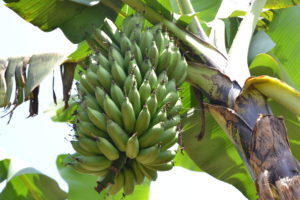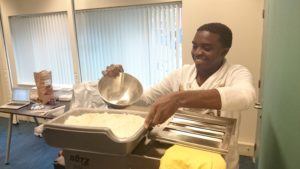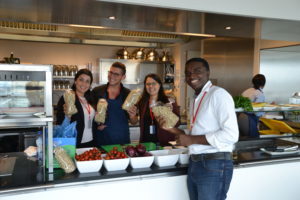In Uganda, agriculture is still the biggest economic sector, consisting mostly of small-sized farms that grow diverse crops, and it continues to retain a high percentage of the labour force. The experienced farmers use predominantly traditional agro-ecological methods rather than modern technology.
Post-harvest loss — due to limited technical skills and inadequate access to modern technologies — is one of the biggest problems in Uganda, which in combination with the lack of economic incentives, suppress agriculture.
Increasing migration of young people from rural areas has also slowed down agricultural development in many African countries, hindering national economic growth. Reframing farming as a professional undertaking would offer highly profitable opportunities for those with the determination to become true agri-entrepreneurs.
Reframing agriculture as a feasible business opportunity
The agricultural system in Uganda, as in many African countries, could and should be set in a different light, to turn it into the business sector that it has the potential to be. Reframing agriculture as a business model is crucial for improving smallholder farm productivity. Earnings from farming will increase when technology — and the knowledge of how to use it — are readily available. This will not only provide farmers with a higher income, but will also encourage young people to stay on the farm or return from urban areas, where unemployment numbers are already high and continue to rise.

IN THE PHOTO: The cooking green banana. PHOTO CREDIT: Sean Patrick
Initiatives around agribusiness and sustainable rural economic development have to become more consumer-centric. By treating agriculture as a viable business model and offering effective business development support — in the form of technology and start-up funds — agriculture can thrive and contribute to ending poverty and hunger.
Ending poverty is partly about teaching people how to make money.
Advancing self-esteem
For a long time, farming has been referred to as a “poor man’s job”. Development initiatives often talk of “poor farmers” in Africa, Asia, and Latin America. This link between farming and poverty has had long-lasting effects, mainly the loss of self-esteem for farmers. This is evident in the huge power imbalance that exists between farmers and traders, farmers and the government, and farmers and blue-collar workers. The increasing number of young people leaving villages to move to big cities confirms that. Food insecurity, climate change, and degradation of natural resources are all reasons for massive youth migration.
Growing up, my parents were into zero grazing and matooke (green bananas) farming – I experienced the devastating effects of post-harvest loss first hand, the need to get produce off the land at any price. I recall t pushing a bicycle stacked with cow food or dripping sacks of organic waste to the plantation. Although I loved farming —and our cows — enduring enormous physical strain, not to mention the verbal harassment from my peers, made me hate everything relating to farming. I still feel that I was lucky, as we lived in the second biggest town in Uganda (Mbarara), I have had good education and a loving family. Other rural areas have it much worse, with limited education for the young men and women, and a heavy economic dependence on a failing farming system.
With Green Banana Food Company, the aim is to change the food system and have the farmers as key partners, implement efficient technologies in distribution, processing, and the management of supply chains. Like most African countries, Uganda needs to and can develop to improve its own food and beverage industry.
IN THE PHOTO: Sean Patrick – Founder of Green Banana Food . PHOTO CREDIT: Sean Patrick
The four main regions in Uganda are diverse, with different foods, habits, and raw materials. Each region has something readily available for specialisation. With help in figuring out how best to use local raw materials and how to specialise, the Ugandan food cultures can profit from this diversity and grow.
Setting up regional specialised businesses
In order to achieve that we have to shift from thinking about agriculture as just farming. We must incorporate processing, social, and cultural changes, as well as accept that foreign and urban-generated approaches to development haven’t worked. So, it’s time to view rural spaces in a new light. Setting up micro-specialised businesses works extremely well in a country such as Uganda; each region can grow and develop into its own area of production. Uganda has very good soil nation-wide, and each unique regional climate and topography can support region-specific crops.
Small-scale appropriate technology, as currently understood and applied, though useful, is not enough to bring about large-scale change. Processing, farming, and supply chain management need sustainable and dynamic technologies.
The use and development of modern technology will most likely bring young people back to the farms and to agriculture in general. If technology is developed and taught by, and for, young farmers (for instance, in specifically designed information hubs), they will see a better return on investment and higher income from farming.
The motivation behind Green Banana Food, and our brands such as Gabanna pasta, is the idea that giving visibility to any positive socio-economic activity will ultimately drive the involvement and investment up. By setting up micro-businesses, each region can specialise and offer desirable products to the market. This is something Green Banana Food wants to contribute to.

IN THE PHOTO: Sean, In his Pasta lab, developing the green banana pasta in 2016. PHOTO CREDIT: Sean Patrick
Consumer-oriented products
Promoting the use of modern technology for agricultural transformation has been an ongoing process. The focus is often on farm productivity and this has resulted in projects that promise farmers a better livelihood, but often miss the key component of any profitable business: the end-consumer.
There is no point in increasing farming productivity alone. Without a receptive market that will consume the products, increased production is useless.
With Green Banana Food company, the focus is on the end consumer. With increased interest in the final product, the number of farmers in the supply chain will also increase. This will create funds to re-invest into training of farm productivity skills. Keeping the market and the end-consumers in mind, we lengthen and strengthen the whole chain, benefiting both the farmers and the national economy in the end.
There are some wonderful examples of initiatives that have already been successfully implemented:
- Infotrade is a great example of using technology for advancing agriculture. It is a market information system that collects, analyses, and disseminates agricultural and other market information.
- The founders of Jibu moved to Uganda and work closely with local people to solve the drinking water problem.
- Other great examples include Kadafrica, BBROOD, and the Green Elephant.
Producing more finished products
The post-harvest loss is one of the biggest problems in agriculture worldwide, not just in Uganda. The solution lies in developing the regional and national markets, rather than exporting and importing produce from abroad.
For example, many processed goods are imported to Uganda, such as ketchup, tomato sauce, and many chocolate products, while Uganda grows its own tomatoes and cocoa.
In 2016, Uganda exported only $2.85B and imported $4.81B, resulting in a negative trade balance of $1.96B. Oil, medicine and Food products are the major imports. Uganda should stop importing the basic finished food products that it could manufacture itself. And it should also stop exporting only raw materials, when finished products could be sold for export, thereby increasing value.
The African economy is a fast-growing middle-class market that’s big enough and capable of supporting a strong specialised food industry.
IN THE PHOTO: Green Banana team at pasta taste testing event in Amsterdam. PHOTO CREDIT: Sean Patrick
The added value is not only monetary but also personal. If a farmer is seen as an entrepreneur instead of as a “poor farmer”, self-esteem will grow, along with the income gained from better production due to modern technology, and post-harvest waste will decrease.
Green Banana – Looking toward the future
Younger generations are viewed as agents for social change. However, innovation and transformation need adequate peer motivation. Uganda, like most African countries, lacks good examples, there are very few successful businesses set up by peers. The wealthy almost always have political connections or links to questionable channels. The goal is to continually highlight successful initiatives and show what can be and is already being done.
Over the years, rural and urban Africa have been portrayed in the media as “poor, struggling, and sick”. Though these issues remain, we need to present Uganda and Africa in a new light – as a place of possibilities, in a more optimistic and triumphant perspective. Sustained motivation needs something bigger to rely on, the idea that an ordinary person can make a difference, for themselves, and society as a whole. Positive affirmations and a positive outlook are needed for Ugandan communities to get out of poverty.
As a social entrepreneur, I think business has to solve both social and economic issues. In the past few years, we’ve established our goals. We want to train entrepreneurship with Ugandan farmers. Also, we can reduce post-harvest loss by teaching farmers about storing and drying their produce, and by producing more half-finished and finished products, such as our Green banana pasta.
IN THE PHOTO: Gabanna pasta. PHOTO CREDIT: Sean Patrick
We are working hard at raising funds to build local processing plants and hubs where information and technology can be readily available. At the processing facilities, experiments can be done to turn raw materials into finished products. Farmers can learn how to use their own raw materials, such as cocoa and tomatoes, to produce finished products that they can sell locally. Local farmers will be more involved in the whole food chain, gain knowledge and build the farmers’ own better perception in society which is a key driver to change their social class, thereby growing from “poor farmers” into entrepreneurs.
Editors Note: The opinions expressed here by Impakter.com columnists are their own, not those of Impakter.com Featured Image Credit: Sean Patrick













